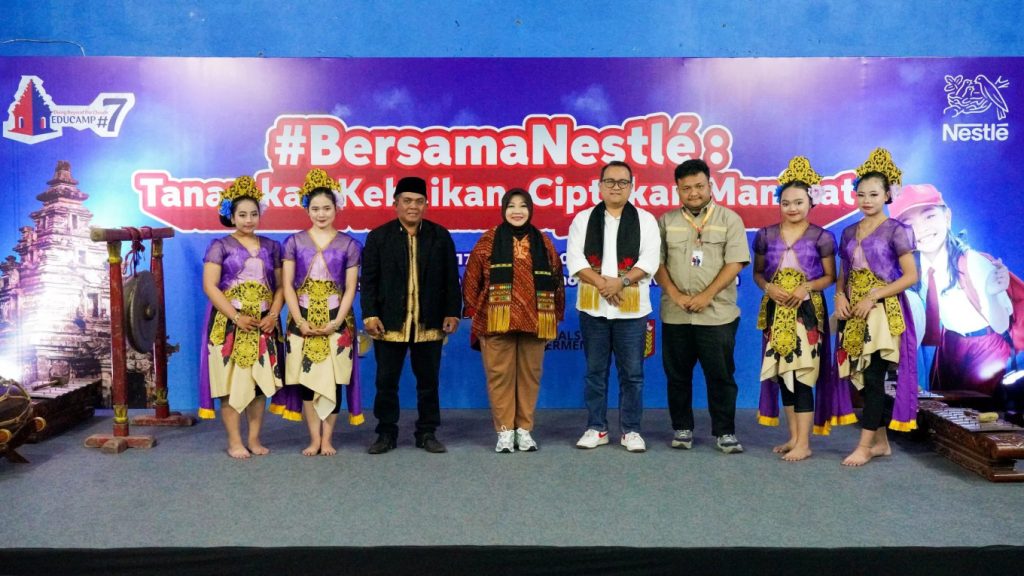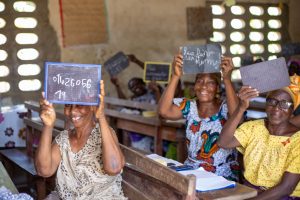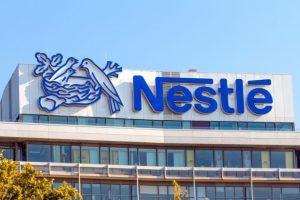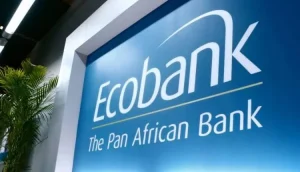
“The true spirit of independence is realized by working together to create positive change…”
— Sufintri Rahayu, Nestlé Indonesia
On a crisp August morning in Buntu Village, on the slopes of the Dieng Plateau in Central Java, a group of village mothers gathered under the shade of acacia trees. They carried empty seedling bags, sandals dusty from the rocky paths, and eyes bright with resolve. Over the next three days, they would take part in a bold experiment: to turn the 80th Independence Day not just into a celebration of history, but a living demonstration of communal progress — through tree planting, skills training, library revitalization, and more.
This was the stage for #BersamaNestlé: Tanamkan Kebaikan, Ciptakan Manfaat (“Together with Nestlé: Embed Goodness, Create Benefit”) — a program launched by Nestlé Indonesia in partnership with Millennials Empowerment and the community of Buntu village. The event blends environmental rehabilitation, human capital development, and corporate branding. But beneath the surface of speeches and ceremonies lies a web of promises, power, tensions and skeptics — and an important question: can a global corporation truly enact sustainable, community-led change at the grassroots, or is it simply performing “goodness” as part of corporate social responsibility?
Setting the Stage: Dieng, Buntu and the Bandaraya Factory
Buntu is a small, mountainous village in the Kejajar subdistrict, Wonosobo Regency, Central Java. Its terrain is vulnerable to erosion. According to local officials, heavy rains wash topsoil down the slopes, threatening both agricultural productivity and downstream water quality. By choosing Buntu, Nestlé places the initiative both symbolically and literally near one of its factories: the Bandaraya facility, which sources fresh milk from farmers as part of its supply chain. (The Jakarta Post)
This proximity raises the stakes. It positions the program not as a distant philanthropic gesture, but as part of Nestlé’s effort to “connect with its surrounding community” and mitigate local environmental risk. (The Jakarta Post)
From Nestlé’s perspective, this is a case study in Creating Shared Value (CSV) — the corporate philosophy that social and environmental objectives can be integrated into business strategy. (Nestlé Indonesia) Nestlé reports that it has already cut carbon emissions 20.38 percent since 2018, accelerated deployment of regenerative farming, and supported more than 10.2 million youth in accessing economic opportunities. (Jakarta Daily – Indonesia News Portal)
Still, one must ask: how far do those numbers reflect structural change versus optics?
Day One: Training, Dialogue and Early Momentum
The program’s agenda was ambitious. On the first day, mothers belonging to PKK (Pembinaan Kesejahteraan Keluarga, the Family Welfare Movement) were taught how to make snacks using local produce — a collaboration with Nestlé’s MAGGI brand. (The Jakarta Post) The idea was to diversify village income sources, particularly for women, while linking the training to consumer goods the company already markets.
Later, a strategic village-development discussion unfolded between officials, community leaders, and Nestlé facilitators. Local agendas such as access to clean water, soil rehabilitation, youth education, and waste management were tabled. The tone was cooperative, though some locals whispered concerns about whether corporate interests might subtly steer priorities.
One villager, who asked to remain anonymous, said in a quiet voice: “We welcome any support — but we don’t want our village to become a showcase. We want continuity, not one-off photo ops.”
Day Two: Tree-Planting and Environmental Stakes
At dawn on day two, residents, PKK mothers, local youth and Nestlé staff trekked to steep hillsides on the village outskirts, once ravaged by erosion. There they planted Rain Trees (Samanea saman) in calculated rows to stabilize the soil. (The Jakarta Post)
It was not just an act of symbolism. The choice of species, spacing, and soil treatment would determine survivability and long-term benefit. Local agricultural extension officers cautioned participants: “Planting is one thing. Maintaining is the real work.”
Meanwhile, in the village classroom, thousands of books and learning kits (including PROMO packs of TRIX, KOKO KRUNCH, MILO, DANCOW, MAGGI and BEAR BRAND) were distributed to children aged 6–12, in celebration of Indonesia’s independence and to stimulate interest in learning. (The Jakarta Post)
A revitalized village library was opened — new shelves, reading corners, cataloging — underscoring the idea that social infrastructure matters as much as physical. But questions lingered: will villagers adopt reading habits? Will the library be sustained? Or will the shelves gather dust once the spotlight fades?
Day Three: Celebration, Reflection and Pledges
The final day was meant as a celebration — regional arts performances, folk festivals, communal meals, speeches. As the sun dipped, villagers and visitors danced, sang, and celebrated their independence anew.
At the closing ceremony, local PKK head Nur Solikhah stood at the mic, her eyes moist: “I feel proud to be able to contribute to our village, especially during this independence celebration.” (The Jakarta Post) Her words reflected genuine pride — but also hope that the momentum would not dissipate.
Harjanto, head of government, social and cultural affairs at Wonosobo’s Regional Development Planning Agency (Bappeda), framed the program as more than charity:
“Activities like #BersamaNestlé do more than deliver aid — they revive the spirit of gotong-royong (mutual cooperation), social awareness, and village independence.” (The Jakarta Post)
Nestlé’s Sufintri Rahayu echoed the corporate intent: these activities are “a concrete manifestation” of CSV, making “shared benefits” for individuals, communities and the planet. (The Jakarta Post)
Yet the true test lies ahead: whether the seedlings survive, whether PKK-run small enterprises prosper, whether library use grows, and whether local governance sustains programming.
Beneath the Surface: Tensions, Skepticism and Realities
No corporate–community initiative is without friction. In examining Nestlé’s broader footprint in Indonesia, several lines of scrutiny emerge:
- Supply chain controversies. In November 2024, Reuters reported that Nestlé and other major brands had been implicated in sourcing palm oil from illegally cleared lands within Indonesia’s Rawa Singkil Wildlife Reserve, home to endangered species. (Reuters) Nestlé responded that 96 percent of its palm oil supply was “deforestation-free” and pledged investigations of implicated suppliers. (Reuters) This raises questions about how deeply supply-chain due diligence is enforced — and whether local “green” gestures can counterbalance systemic risks higher up.
- Awards vs. impact. Nestlé Indonesia recently received the silver award in the “Best Practice in Creating Shared Value” category at ICSA 2024, lauded for partnership with dairy farmers. (Antara News) While an accolade is not meaningless, awards often reflect documented processes more than long-term effect.
- CSR fatigue and ephemeral programs. Across development literature, critics warn of “CSR theatre” — programs that shine briefly, attract media attention, and then fade, leaving local communities uncertain. The villager’s caveat — “don’t become a showcase” — resonates here.
- Maintenance and accountability. Planting trees is only the first step; survival rates, soil retention, water-holding capacity, pest control, and ongoing monitoring define ecological success. Similarly, training mothers in snack-making or micro-business requires market access, credit, ongoing mentoring, and safeguards against exploitation.
- Power dynamics. When corporate agendas are involved, the risk is that local priorities will be subtly aligned to brand aims (e.g. promoting Nestlé’s product lines), rather than autonomous community design. It is essential that communities remain in control of direction, not treated as passive beneficiaries.
Why This Matters: Relevance to Societal Needs
Indonesia, like many emerging economies, confronts overlapping crises: environmental degradation (deforestation, soil erosion, water scarcity), inequality, rural poverty, literacy gaps, and climate vulnerability. Initiatives like #BersamaNestlé could, in theory, address integrated challenges: rebuild topsoil, diversify rural incomes, support education, strengthen local institutions — all near the corporate operational footprint.
But the relevance lies not in single events — it lies in continuity, scale, and accountability. If Buntu becomes a replicable model — with high tree survival, sustainable microbusinesses, lasting library culture, and transparent local governance — then it might transcend PR and become substantive. If not, it becomes a footnote in Nestlé’s CSR portfolio.
For journalism and public accountability, the story demands follow-up. Months from now, return to Buntu: Which seedlings grew? Did mothers sell snacks? Did library traffic rise? Were village budgets shifted to sustain the momentum? Who oversees monitoring, and how transparent are metrics to the public?
In an era when corporate sustainability claims are under increasing scrutiny — including allegations of greenwashing in palm oil sourcing — programs like #BersamaNestlé should be measured not in speeches or visuals, but in measurable, sustained community outcomes.
Because celebration of independence ends — but real independence, in economic, social, environmental terms, must be earned day by day.
Sources & References
- “Nestlé Indonesia promotes spirit of independence through community empowerment” — Jakarta Post (The Jakarta Post)
- “Nestlé Indonesia Advances Green Goals With Emission Cuts, Regenerative Farming” — Jakarta Daily (Jakarta Daily – Indonesia News Portal)
- “Komitmen Nestle Implementasikan Program Keberlanjutan” — IDN Times (IDN Times)
- “PT Nestlé Indonesia Raih Penghargaan Indonesia Corporate Sustainability Award” — ANTARA News (Antara News)
- “Nestlé Indonesia wins silver at ICSA 2024 for strong partnership with local dairy farmers” — Jakarta Post (The Jakarta Post)
- “Nestlé Indonesia continuous fight against stunting through nutrition education” — Jakarta Post (The Jakarta Post)
- “Nestle, P&G investigate palm oil sourcing after green group’s Indonesia deforestation report” — Reuters (Reuters)










